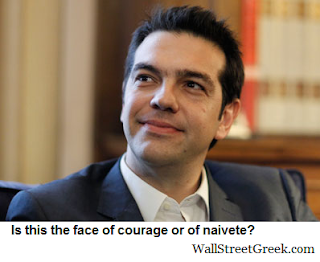Greece, Greeks and Greek Soccer Should Demand More
 The Greek crisis and the performance of the Greek national soccer team inspired this editorial opinion piece perhaps long overdue.
The Greek crisis and the performance of the Greek national soccer team inspired this editorial opinion piece perhaps long overdue.
As I watched Greece’s pivotal soccer match versus its political prodder Germany, a quarter-final game for the 2012 UEFA European Cup, I could not help but notice the similarities of the Greek team’s approach to Greece’s efforts to mitigate its financial crisis.
I renounced my ethnicity more than once during the course of Greece’s attempt at Euro 2012, and pleaded tearfully with the Lord to just give us this if not anything else. I knew divine intervention would be necessary, and just asked for a few crossbar and goalpost saves to assist our embattled goalie and bombarded defense. Alas, it was not to be, as the third ranked Germans overwhelmed the still improving Greek soccer program (ranked 15 by FIFA).
Despite the advancements of the Greeks over the years, I still found myself frustrated with the strategy employed and the execution of play on the field. I’m not a passive follower of soccer, having walked on to my NCAA Division I college soccer program, and having played and coached competitive sports all my life. My critical mind and discerning vision is neither limited to economic and securities analysis, or at least I like to think so. Thus, I noted the many issues that constrained my ancestral ethnic team against the advanced play of the Germans. In that same regard, I see why Greece has struggled economically speaking.
A Few Similarities between Greece and the Greek National Team:
- Each are led by foreigners who cannot fully understand Greek nature nor Greek potential
- Each employ a defeatist strategy, defensively postured to endure not conquer
- Each often regress to selfish though passionate flails at scoring
- When not stressed, the Greeks and Greece act lackadaisically and passively
- Each fails to notice risks effectively
With all due respect to Greece’s excellent coach, Fernando Santos, and to Greece’s questionable European economic advisors, the view from the outside inward inherently falls short of producing adequate understanding. Only a Greek can truly know the strengths and weaknesses of the Greeks, and therefore, only a Greek can structure a system that will play to those strengths and weaknesses. That leads me to the second and third points.
The last two coaches of Greek soccer have employed defensive schemes. It’s because of a lack of confidence in the skill and potential of Greek players. This, in turn, is because of the long-term history of Greek soccer, which has fallen well short of the results of its rivals in Germany, France, Spain, Italy, England, the Netherlands and Portugal. Obviously, the development of league play has helped those nations to better their domestic talent. As more Greek players fine tune their craft in the advanced leagues of Europe, Greece will benefit as well.
The same lagged development applies to the problems with Greece, which was stymied by the West’s abandonment of it to Ottoman domination for centuries. After the world wars of the last century, Greece was stripped barren and left to grow as best it could without the fertile support of the West. Therefore, its culture strayed for survival’s sake, away from its brilliance of ancient times.
You see, the survivalist’s mantra is often a selfish one, born out of necessity. The survivor trusts in what he controls only and strives to the utmost to make his own way. Thus, perhaps the Greek businessmen of today, while creating thriving businesses, micromanage them and rarely scale to optimal potential. The Greek economy is thus dysfunctional, because Greek businesses do not feed one another fluidly. I’m sorry to say that I believe for the most part, the only time a Greek helps another Greek is when his hand is greased. It’s not enough to win the trust of a business partner or to act for the sake of good faith. In this, maybe Greeks are just the same as everyone else.
There’s plenty of passion in Greece, for life and for the good fight when a challenge avails. Challenge, in fact, brings out the best in Greeks. But without a challenge, I feel we fall into a trap of relaxation and lackadaisical play. It’s hard not to be this way when you have lived long enough in Greece, which for me is pure paradise. When it comes to managing a nation, though, there had better be no loss of focus. Perhaps it’s the same lulling life that led Greek government managers to underestimate risk when they undertook too many projects for their bleak budget to handle, piling on debt to manage it all. Once the economy came under pressure, capital dried up and Greece was left in crisis. That’s not to mention the lies the government told to get into the euro-zone and to keep its debt issues hidden.
What I would like to see from Greece and the Greek team moving forward is a hatred for losing. The team and Greek politicians and business managers should hate losing so much to make it intolerable. This intolerance should drive the necessary energy for winning, to lead players and managers to learn how to win and to approach their training and business and government operation with a fire for victory. I think it’s this competitive spirit that drives success in the United States, Germany and China today.
And the defeatist attitude needs to be reversed. Greeks are just as athletic, intelligent and creative as any Spaniard, German or other European. There’s no reason why the team shouldn’t be able to go head to head with its competition.
I also have a pet peeve with regard to cheating and lying, including the sort the Greek team (and other teams) employ to draw penalty or win some minor battle. It’s a lie when you fake an injury on the field of play, and the law on cheating and lying is plainly clear and applies to soccer as well as to life. If our players would fight through tough plays, like I know they can, I’m certain they would do better than they do by generating bad karma through lies on the fair field of play. Likewise, corporate and government corruption globally and corruption generally in Greece disgusts me. We should be better than that, based on the dictum of our faith, period! Once again, this is not a Greek problem, but a societal problem globally. Practicing false expertise while in actuality cheating and lying is also without excuse, especially when one judges others from that position. This again is a societal flaw, not a Greek one, but I would like to see us (people) rise above it.
There’s no reason why the Greek nation cannot lead Europe once again. But for that to happen, the nation must digest the reality of the situation together. The Greek citizenry must continue to push its politicians to do the right thing, or be replaced, even by newcomers. Perhaps, finally, the legacy of certain family dynasties garnering unwarranted levels of respect in Greece has ended. Leadership must be earned on a daily basis for it not to become complacent, and it should be regardless of last name or the legacy of ancestors.
You know, Nike (NYSE: NKE) had that great slogan, “Just do it,” and the old owner of the Oakland Raiders, Al Davis, use to say, “Just win baby!” It’s a simple message, but it’s true through the goal mouth. When victory is your goal, you find creative ways to make it happen when conventional methods do not work. Fervor and vigor - who has got it? That team or nation will be the victor nine times out of ten, unless the game clock stops first, because it will work hardest to make it be.
It’s the responsibility of the Greek government now to be creative, to find ways to create an expanding budget surplus and to create income opportunities for Greek citizens. It’s also the Greek government’s responsibility to raise its voice to the referee when treatment is unfair, and to that I refer to the IMF and EU, which are overstressing Greece. Granted, Greece dug its own grave, but the EU need not push the nation into it now, especially after leading it into the cemetery in the first place.
Whether it be with regards to Greece, the Greek citizenry or the Greek national soccer club, victory is going to take will, effort and creativity. Enough words like these have been written though. Now is the time for action and success or failure, and the respective fallout due to each. For Greece, I wish only the best, but I also demand the best of all Greeks.
See also Greece vs. Germany - A Game for Pride.
Editor's Note: This article should interest investors in National Bank of Greece (NYSE: NBG), Hellenic Telecommunications (NYSE: OTE), Coca-Cola HBC (NYSE: CCH), Teekay Corp. (NYSE: TK), Navios Maritime Holdings (NYSE: NM), Navios Maritime Acquisition (NYSE: NNA), Navios Maritime Partners L.P. (NYSE: NMM), Tsakos Energy Navigation Ltd. (NYSE: TNP), Overseas Shipholding Group (NYSE: OSG), International Shipholding (NYSE: ISH), Excel Maritime Carriers (NYSE: EXM), Safe Bulkers (NYSE: SB), Claymore/Delta Global Shipping ETF (NYSE: SEA), Genco Shipping & Trading (NYSE: GNK), Diana Shipping (NYSE: DSX), Danaos (NYSE: DAC), Tsakos Energy Navigation (NYSE: TNP), Ship Finance Int'l (NYSE: SFL), Nordic American Tanker (NYSE: NAT), Seaspan (NYSE: SSW), General Maritime (NYSE: GMR), DHT Maritime (NYSE: DHT), Brunswick (NYSE: BC), Marine Products Corp. (NYSE: MPX), DryShips (Nasdaq: DRYS), Top Ships (Nasdaq: TOPS), Eagle Bulk Shipping (Nasdaq: EGLE), Sino-Global Shipping (Nasdaq: SINO), Paragon Shipping (Nasdaq: PRGN), K-SEA Transportation Partners (NYSE: KSP), Euroseas (Nasdaq: ESEA), Star Bulk Carriers (Nasdaq: SBLK), Omega Navigation (Nasdaq: ONAV), Knightsbridge Tankers Ltd. (Nasdaq: VLCCF), TBS Int'l (Nasdaq: TBSI), Golar LNG (Nasdaq: GLNG), Claymore/Delta Global Shipping (Nasdaq: XSEAX), American Commercial Lines (Nasdaq: ACLI), Deutsche Bank (NYSE: DB), ITA (Nasdaq: ITUB), Banco Santander (NYSE: STD), Westpac Banking (NYSE: WBK), UBS (NYSE: UBS), Lloyd’s Banking Group (NYSE: LYG), Barclay’s (NYSE: BCS), Credit Suisse (NYSE: CS), Allied Irish Banks (NYSE: AIB), Banco Latinamerican (NYSE: BLX), Bank of America (NYSE: BAC), Citigroup (NYSE: C), Goldman Sachs (NYSE: GS), JP Morgan (NYSE: JPM), Morgan Stanley (NYSE: MS), European Equity Fund (NYSE: EEA), Vanguard European Stock Index (Nasdaq: VEURX), Powershares FTSE RAFI Europe (NYSE: PEF), Europe 2001 (NYSE: EKH), S&P Emerging Europe (NYSE: GUR), Ultrashort MSCI Europe (NYSE: EPV), Vanguard Europe Pacific (NYSE: VEA), Wisdomtree Europe SmallCap (NYSE: DFE), Wisdom Tree Europe Total Div (NYSE: DEB), iShares S&P Europe 350 (NYSE: IEV), Morgan Stanley Eastern Europe (NYSE: RNE), DWS Europe Equity A (Nasdaq: SERAX), DWS Europe Equity B (Nasdaq: SERBX), Fidelity Europe (Nasdaq: FEUFX), Fidelity Europe (Nasdaq: FIEUX), ICON Europe A (Nasdaq: IERAX), Pioneer Europe Fund (Nasdaq: PBEUX), ProFunds Europe 30 (Nasdaq: UEPIX), Putnam Europe A (Nasdaq: PEUGX), Rydex Europe 1.25x (Nasdaq: RYAEX).
Please see our disclosures at the Wall Street Greek website and author bio pages found there. This article and website in no way offers or represents financial or investment advice. Information is provided for entertainment purposes only.

Labels: Editorial, Editorial-2012, Editors_Picks, Editors-Picks-2012-06, Greece, Greece-2012-Q2, Greek_Topics, Greek-Topics-2012-Q2




































